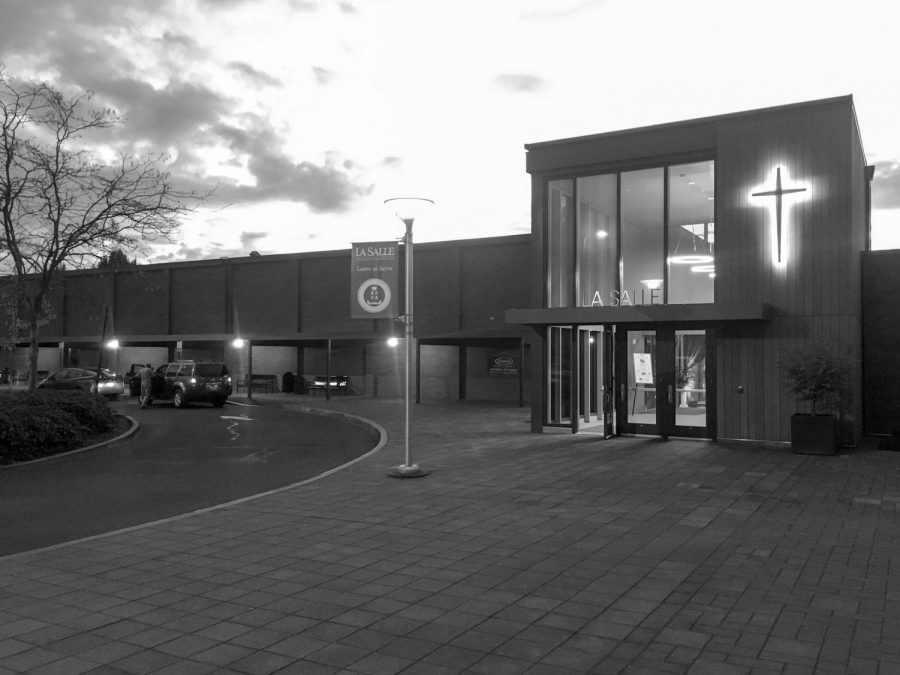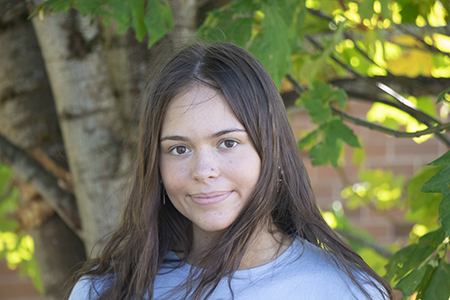Social Distancing or Distance Learning: What Will Next School Year Look Like?
“Education is much more than teaching students content or having students reach academic standards,” Vice Principal of Curriculum and Development Ms. Alanna O’Brien said.
June 3, 2020
With 10 weeks of remote learning in the books, and the 2019-2020 school year coming to a close, there is one question that many in the La Salle community are wondering about: What will next year look like?
To answer that question, The Falconer spoke with Principal and President Mr. Andrew Kuffner, Vice Principal of Curriculum and Professional Development Ms. Alanna O’Brien, and Vice Principal of Academics Mr. Mario De Ieso.
While plans remain uncertain, Mr. Kuffner said that the administrative team has been discussing three potential scenarios, which include returning to campus entirely, part time, or not at all.
Which of these scenarios will ultimately come to bear will depend largely on how successful public health measures are to contain the spread of the coronavirus, as Mr. Kuffner emphasized that the school would follow the official guidance that the state of Oregon will provide to schools.
However, Mr. Kuffner made clear that he believes the most likely scenario is a hybrid learning system, which includes partially in-person and partially remote learning with “smaller groups of students on campus at a time,” he said.
Ms. O’Brien said that the benefit of having at least some on-campus time is that “many learning experiences are better in person [such as] art classes, theater classes, science labs, [and] Socratic seminars.”
A similar idea was shared by Mr. De Ieso, as he said that with this system “flexibility [can] be built into the schedule to allow some people to be on the campus and some people to be off… [If people] either need to be quarantined, or come down with the virus, or become in contact with someone with the virus… [this would] allow for them to be off campus and still learn digitally.”
In developing plans, Mr. Kuffner and the administrative team have been meeting via Zoom daily. Mr. De Ieso has been in charge of building the master schedule, Ms. O’Brien is overseeing curriculum and providing teachers with guidance, and Athletic Director Mr. Chris George as well as Vice Principal of Student Life Mr. Brian Devine are both making plans for student safety and engagement.
In addition, Mr. Kuffner has convened a task force made up of a number of staff members, which is meeting once per week to include a variety of people and perspectives in the planning process.
“We’re getting a lot of questions and we’re getting a lot of people offering feedback, so… let’s create a task force that will intentionally gather this feedback,” Mr. Kuffner said.
In addition, next week, the administrative team will invite students, parents, and other staff members to participate in focus groups, allowing them to offer ideas that they want taken into consideration.
In order to allow members of the community to anticipate and prepare for what is to come, Mr. Kuffner said that he hopes to have a tentative plan figured out by the end of June.
“We are really focused on getting this year completed well and giving as much energy to this as possible, to helping the seniors graduate and celebrate them… [and] to helping the ninth, tenth, and eleventh graders finish strong,” he said.
After that, planning for next year will be the primary focus, as Mr. Kuffner said, “I feel like [the] end of June is a real time where families also want to know what you’re planning [and] what you’re thinking.”
Currently, the number of confirmed coronavirus cases in America is approaching two million and the number of deaths has surpassed 100,000. Although the curve has flattened dramatically, it is starting to rise again in some places as states across the country begin to reopen.
While more than 4,000 confirmed cases in Oregon might seem less shocking, the number of cases are also rising with the lifting of Governor Kate Brown’s ‘stay home’ order in almost every county.
Another major concern that aligns with the curve slowly starting to rise again is a newly discovered and potentially deadly condition that is found in youth and linked to COVID-19 — multi-system inflammatory syndrome. Much about this condition remains unknown, but that makes the practice of good hygiene, safety measures, and social distancing crucial even for children and teenagers.
With this school year coming to a close, several La Salle students shared their thoughts on what they are hoping for next year.
Sophomore Ella Gach said that she hopes to “somewhat come back to the normal that we know but also be safe. We don’t know what the future looks like regarding COVID-19, but I would love to return back to school and see my teachers and friends — even if that means a new system developed to ensure the spread of COVID-19 doesn’t increase, that would be better than not returning at all.”
Junior Nick Riley reiterated these thoughts.
“Next year, I hope that our community is closer than ever, considering how much has changed in our world,” he said. “I would love to return [to school] so I can cherish the last year I have at La Salle and be able to spend time with my friends and teachers.”
As schools reopen in other parts of the world, many new procedures and practices are being adopted. At a school in Germany, for example, students administer their own coronavirus test every four days, and then are able to be on campus without wearing a mask. In China, plexiglass screens are placed on top of desks. And at a school in Montana, the principal is checking students’ temperatures before they enter the building.
So, what will La Salle do to prevent transmission on campus?
There are a lot of different issues that need to be considered. For example, the current guidance from Centers for Disease Control and Prevention (CDC) regarding the reopening of schools states that each person in the building should wash their hands frequently, wear a mask, and maintain social distance.
One of the biggest challenges for most schools, La Salle included, will be the practice of social distancing, especially during lunch and passing periods.
“I don’t see anything that would tell me that social distancing will not be an expectation,” Mr. Kuffner said. “Every business [and] every restaurant — they’re all having to figure that out, so I don’t think schools are going to be any different… I think we have to figure that out.”
Mr. Kuffner said that it seems likely that one-way hallways will have to be put in place to prevent congestion during passing periods, but in regards to lunch, many questions persist.
“Is it going to be in classrooms?,” he said. “Is it going to be [in] spread out, designated areas?… [Will we] bring some tents into the courtyards and have seating out there? What can we do creatively to maximize kids’ flexibility?”
The practice of social distancing will likely be an issue in classrooms as well. Mr. De Ieso said that they’re looking further into the size of classrooms, how many desks a classroom can fit, if other areas in the school can be repurposed, and how many students will be allowed in a single class at a time.
Despite these circumstances, Mr. De Ieso also shared that La Salle isn’t in as difficult of a situation as other schools.
“We have a good layout at school,” he said. “We’re all on one floor… We do have available classrooms from time to time…. and we do have relatively small class sizes to begin with.”
In addition to maintaining social distance, the CDC also encourages the implementation of safety protocols and procedures that will include ongoing monitoring for symptoms of the virus and developing plans for what to do when someone becomes ill.
Mr. Kuffner said that as of right now, he expects to rely heavily on advice and assistance from health authorities.
“The school is not a health authority, [but] we’re going to be supportive as much as we can to that effort,” he said. “What we can do is design the educational system so that the students still are able to access [schoolwork]… I don’t want there to be an incentive for kids to come to school if they’re sick… It should be really easy for them to be able to access everything they need from home.”
Ms. O’Brien added that “many people hold onto the idea that teaching is about being in front of a room lecturing, but with all the resources at students’ fingertips, this doesn’t have to be the case.”
If students are unable to return to campus, digital learning days would likely continue similar to how they worked this spring. However, Mr. Kuffner said that the administrative team would continue to listen to student feedback, so that they would know when to make adjustments.
“We’ve learned a lot, and [DLDs] would be more adapting,” he said. “If it were to be that the order from the governor is that no school can open on campus, then of course… we’ll offer the best online education to the kids that we can.”
Looking ahead, Mr. De Ieso said, “I want people to come in with a flexible mindset so that when they start the school year they realize that probably it’s going to be less than ideal [and] it’s probably not going to be entirely what they originally hoped to get signed up for when they registered to start school at La Salle, whether they be incoming freshman or someone who’s heading into their senior year. We’re all in this together. It’s a learning experience.”
Mr. Kuffner echoed these sentiments.
“I would want [students] to recognize that this is temporary, and that no one is interested in creating a system that doesn’t work,” he said. “We really, really want to create a system that works well for the kids, and the teachers, and everybody.”
Mr. Kuffner also hopes that everyone will “be willing to share what’s working and what’s not working, and then be willing to try new things.”
Ms. O’Brien added, “I want students to know that we hope to see them in person in the La Salle hallways, and we are working really hard to create that option. That being said, if we need to be at home, we will still be there for our students and we will continue to refine our ability to teach and connect from a distance.”
“Education is much more than teaching students content or having students reach academic standards,” she continued. “Education, especially at La Salle, is about relationships and community and working together to make the world a better place. We need to keep these things in front of us as we consider our options for next year.”





